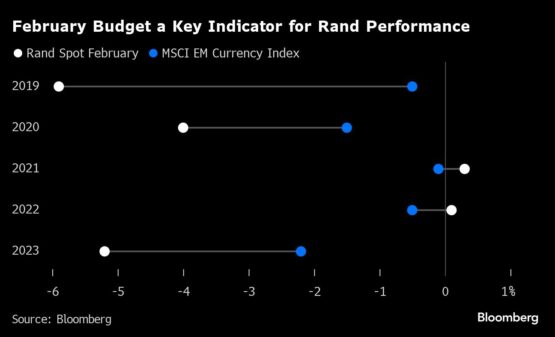February, when South Africa releases its annual budget, can be a terrible month for the rand, and this year will be no different, many investors expect.
Last February, the rand fell 5.2% against the dollar, as rolling power blackouts crimped economic output, forcing finance minister Enoch Godongwana to announce a $14 billion budget bailout for Eskom. It was the worst performer that month among emerging market currencies tracked by Bloomberg.
ADVERTISEMENT
CONTINUE READING BELOW
In February 2020, the rand shed 4% after ratings agency Moody’s highlighted risks to South Africa’s budget forecast. And in February 2019, it slumped 5.9% after the finance minister unveiled the highest budget deficit in a decade. All in all, data show the rand has endured an average 2.9% loss in February over the past five years, while the EM currency index slipped 1%.
The pattern of February weakness doesn’t hold over the longer-term, however, and the rand also ended the month flat in February 2021 and 2022 — years when the budgets were applauded by investors. It all suggests the currency’s fortunes are closely tied to the budget, which this year will be unveiled on February 21.
“The budget is the largest contributor to rand weakness in February,” said Peter C Earle, senior economist at the American Institute for Economic Research. “The deeper in debt a nation becomes, and as its government shows either an inability or a lack of interest in controlling its budgets, the more the currency will tend to suffer.”

The rand has started 2024 on the back foot, sliding almost 1.5% against the dollar, compared to a 0.7% average loss for the EM currency index. It could still find its feet if upcoming US interest rate cuts encourage an investor rush back into developing nations. But the signs — for February at least – are not promising.
Rand vs dollar over 36 months
For one, South Africa holds a national election later in 2024, with the ruling African National Congress at risk of losing its majority for the first time since the end of White-minority rule in 1994. That will up the pressure on politicians to spend on vote-winning giveaways.
President Cyril Ramaphosa hinted last month at introducing a basic income grant, saying there is a “strong case” for it despite fiscal constraints.
Read: Ramaphosa hints at income grant as election nears
ADVERTISEMENT
CONTINUE READING BELOW
“The Ramaphosa administration hasn’t been able to restore confidence in the rand among institutional investors since the last election,”said Piotr Matys, senior FX analyst at InTouch Capital Markets. To retain power, the government could resort to a budget that exacerbates its fiscal problem, hurting the rand, he added.
Godongwana, meanwhile, has already used November’s medium-term budget statement to announce a borrowing increase. He’s committed in particular to extending a Covid-era monthly payment for low-income citizens until March 2025 and to fully implement previously announced pay increases for 1.3 million state employees.
The announcements are unnerving investors, whose holdings of South African bonds are already at a record low, following a slew of corruption scandals, crises at Eskom and state-run rail and ports operator Transnet, and the government’s ever-widening financing needs. The consolidated budget deficit should widen to 4.8% of gross domestic product this year, and remain at 4.6% in 2025, Fitch predicts, a major overshoot of official estimates.
“Will a wider budget deficit come as a surprise to investors? No, it really shouldn’t. But, perhaps some might still be hoping that the government does more to reign in spending,” said Carmen Altenkirch, an analyst at Aviva Investors Global Services.
A moderate budget that doesn’t compromise too much on the fiscal side should support the rand, Altenkirch said, though she is not hopeful.
“For South Africa, the challenge is that it’s more than just the budget deficit. It’s the financing requirement, which includes Eskom. This is likely to gain even greater focus than just the headline deficit,” she added.
© 2024 Bloomberg


